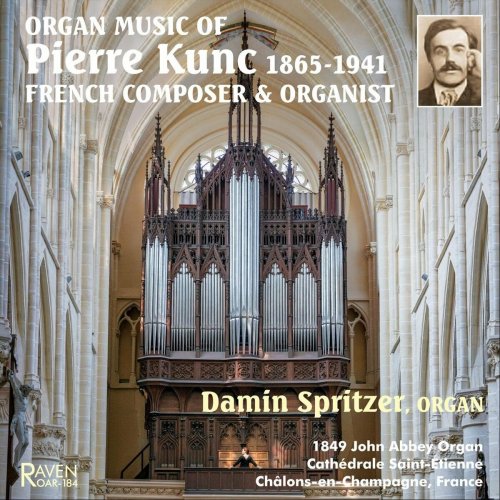
Damin Spritzer - Organ Music of Pierre Kunc (1865-1941), French Composer & Organist, 1849 John Abbey organ, Chalons Cathedral (2023)
BAND/ARTIST: Damin Spritzer
- Title: Organ Music of Pierre Kunc (1865-1941), French Composer & Organist, 1849 John Abbey organ, Chalons Cathedral
- Year Of Release: 2023
- Label: Raven
- Genre: Classical
- Quality: FLAC (tracks)
- Total Time: 79:54 min
- Total Size: 330 MB
- WebSite: Album Preview
Tracklist:
01. Symphony in D Minor: I. Fantasie
02. Symphony in D Minor: II. Canzona
03. Symphony in D Minor: III. Toccata
04. Pièce Funèbre
05. Communion
06. Sortie fuguée
07. Adagietto
08. Les Prières de l’Orgue: I. Bénissez Dieu, mes frères les oiseaux
09. Les Prières de l’Orgue: II. Pastorale
10. Les Prières de l’Orgue: III. Improvisation
11. Marche Religieuse
12. Grand Pièce Symphonique
01. Symphony in D Minor: I. Fantasie
02. Symphony in D Minor: II. Canzona
03. Symphony in D Minor: III. Toccata
04. Pièce Funèbre
05. Communion
06. Sortie fuguée
07. Adagietto
08. Les Prières de l’Orgue: I. Bénissez Dieu, mes frères les oiseaux
09. Les Prières de l’Orgue: II. Pastorale
10. Les Prières de l’Orgue: III. Improvisation
11. Marche Religieuse
12. Grand Pièce Symphonique
Pierre Aloÿs Marie Joseph Kunc (1865-1941), born in Toulouse, France, came from a family of outstanding musicians. His father, Aloys, studied organ and composition in Toulouse and served as professor of music at the college of Saint-Marie. Aloÿs was also very active in the association of Catholic musicians seeking to restore liturgical chant in the churches of Paris, and he founded the review Musica Sacra, for which Pierre served as an editor. The most prominent member of the Kunc family was Aimé Kunc, winner of the Prix de Rome (1902) and director of the Toulouse Conservatory. Both Pierre’s mother, who studied with César Franck, and sister were organists. This family of musicians dominated the musical scene in Toulouse for many years.
Initially, Pierre embarked on a career as a university professor, but he later enrolled in musical studies at l’École Niedermeyer, where he studied with Ernest Guiraud (composition) and Eugène Gigout (organ). After earning his diploma, Pierre commenced a career as organist, choirmaster, teacher, and composer. He held numerous positions in and around Paris, including a lengthy tenure as professor of music at l’École Sainte Genevieve. But his highest-profile position was that of maitre de chapelle at l’Eglise Saint-Sulpice (beginning in 1928), where Charles-Marie Widor and Marcel Dupré each served as organiste titulaire.
Kunc’s musical output is substantial, but outside of the organ music, only some choral music and a viola sonata are known to have appeared in print. In terms of style, Kunc was influenced greatly by the works of Franck and Wagner. Those influences, coupled with his devout Catholic faith, likely led to Kunc’s relatively conservative style, a factor that may have contributed to his lack of renown outside of France. Reviews of his music were mixed. Some critics felt that his style was not serious enough, while others praised his music for its originality and “not [being] smothered in tricks.” If Kunc failed to earn a prominent place in the broader musical community, that might also reflect the loftier status of his brother Aimé, whose renown was greater due to winning the Prix de Rome; the two were sometimes confused for each other. Still, Pierre Kunc left his musical mark on France with the well-crafted organ music found on this disc.
Initially, Pierre embarked on a career as a university professor, but he later enrolled in musical studies at l’École Niedermeyer, where he studied with Ernest Guiraud (composition) and Eugène Gigout (organ). After earning his diploma, Pierre commenced a career as organist, choirmaster, teacher, and composer. He held numerous positions in and around Paris, including a lengthy tenure as professor of music at l’École Sainte Genevieve. But his highest-profile position was that of maitre de chapelle at l’Eglise Saint-Sulpice (beginning in 1928), where Charles-Marie Widor and Marcel Dupré each served as organiste titulaire.
Kunc’s musical output is substantial, but outside of the organ music, only some choral music and a viola sonata are known to have appeared in print. In terms of style, Kunc was influenced greatly by the works of Franck and Wagner. Those influences, coupled with his devout Catholic faith, likely led to Kunc’s relatively conservative style, a factor that may have contributed to his lack of renown outside of France. Reviews of his music were mixed. Some critics felt that his style was not serious enough, while others praised his music for its originality and “not [being] smothered in tricks.” If Kunc failed to earn a prominent place in the broader musical community, that might also reflect the loftier status of his brother Aimé, whose renown was greater due to winning the Prix de Rome; the two were sometimes confused for each other. Still, Pierre Kunc left his musical mark on France with the well-crafted organ music found on this disc.
Year 2023 | Classical | FLAC / APE
As a ISRA.CLOUD's PREMIUM member you will have the following benefits:
- Unlimited high speed downloads
- Download directly without waiting time
- Unlimited parallel downloads
- Support for download accelerators
- No advertising
- Resume broken downloads


